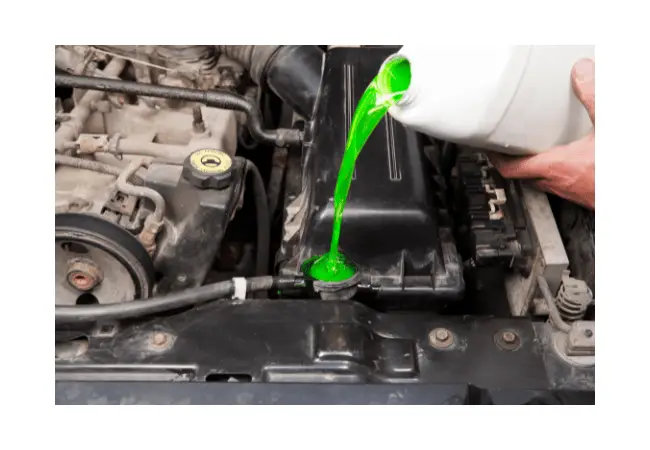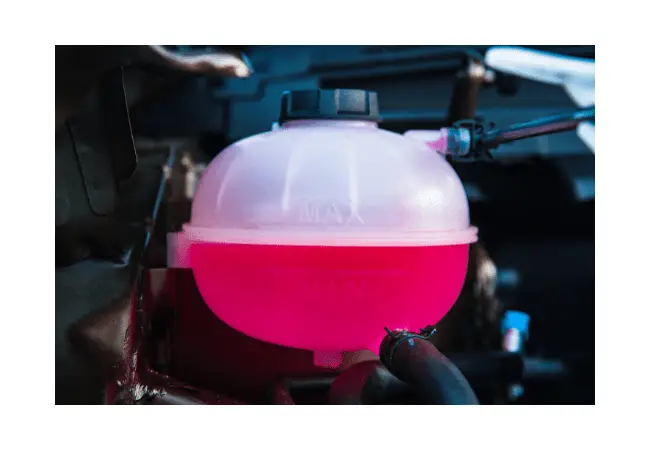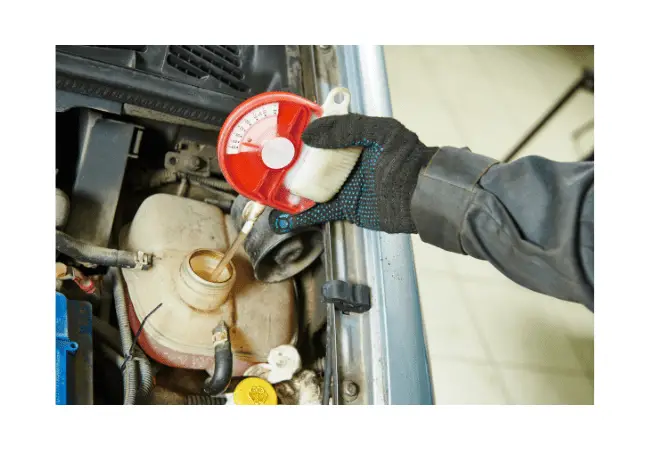Vehicle maintenance can be a daunting task for many, as it involves understanding various components and their functions under the hood. Two terms that are often used interchangeably but may leave car owners perplexed are “radiator fluid” and “coolant.” Are they one and the same, or is there a difference? In this article, we will unravel the mystery surrounding these terms and answer the essential question: Is radiator fluid the same as coolant?
The terminology surrounding automotive maintenance can be confusing, and “radiator fluid” and “coolant” are no exceptions. Many people mistakenly believe these terms are synonymous, leading to potential misconceptions about their vehicle’s cooling system. However, the answer is clear-cut: radiator fluid and coolant refer to the same substance in the context of a vehicle’s cooling system. They both serve the vital purpose of regulating the temperature of your engine and preventing it from overheating.
Now that we’ve established that radiator fluid and coolant are indeed the same, it’s crucial to understand their role in your vehicle’s engine. This liquid circulates through the engine and radiator, absorbing heat generated during combustion and dissipating it into the surrounding air. By doing so, it prevents the engine from reaching dangerously high temperatures, ensuring it operates efficiently and preventing damage due to overheating. In the subsequent sections of this article, we will explore the composition of radiator fluid, its importance in maintaining engine health, and how to monitor and maintain the proper coolant levels in your vehicle.

Understanding vehicle maintenance is paramount for every vehicle owner or driver. It not only ensures the longevity and efficient operation of your vehicle but also promotes safety on the road. A well-maintained vehicle is less likely to break down unexpectedly, potentially causing accidents or leaving you stranded in inconvenient or dangerous situations.
Specifically, understanding the role of fluids such as coolant or radiator fluid is crucial. These fluids are integral to the proper functioning of your car’s engine, and a lack of proper maintenance can lead to severe engine damage. Knowing when and how to check these fluids, and their appropriate levels, and recognizing signs of potential problems can save you costly repairs or replacements down the line. It empowers you to take proactive steps in vehicle care, rather than reactive measures when issues escalate.
Jump To
Understanding Vehicle Fluids
Vehicles rely on various types of fluids to operate smoothly and efficiently. First and foremost is motor oil, which lubricates the engine, reducing friction and heat. Transmission fluid is another vital type of fluid that lubricates the components of the transmission, ensuring smooth gear shifts. Brake fluid plays a critical role in the braking system by transferring the force of your foot pressing the brake pedal into the pressure necessary to stop the vehicle. Power steering fluid enables easy and controlled steering by transferring power from the steering wheel to the steering gear. Coolant or radiator fluid, the focus of our discussion, is essential in regulating the engine’s temperature and preventing overheating.
Other fluids include windshield washer fluid for cleaning your windshield and differential fluid for lubricating the differential in vehicles with rear-wheel drive. Each of these fluids plays a unique role and requires regular checks and maintenance to ensure your vehicle operates as it should.
Oil
Engine oil, often referred to as motor oil, is the lifeblood of your vehicle’s engine. It provides lubrication to the numerous moving parts that make up an engine, reducing friction and the accompanying heat. The oil forms a thin, protective layer between these parts, minimizing wear and tear, and helping to prevent overheating. Over time, engine oil can break down and become contaminated with dust, dirt, and debris from the engine and the environment. This is why regular oil changes are an essential part of vehicle maintenance.
Transmission Fluid
Transmission fluid is a special type of oil designed specifically for transmission systems. Its primary function is to serve as a lubricant for the gears in the transmission, ensuring smooth and efficient gear shifts. Additionally, it also acts as a coolant, helping to maintain the transmission’s optimal operating temperature. Like engine oil, transmission fluid can degrade over time and lose its effectiveness, requiring periodic replacement.
Brake Fluid
Brake fluid is a hydraulic fluid that plays a crucial role in your vehicle’s braking system. When you press the brake pedal, the brake fluid transfers this force into pressure, which then causes the brake pads to clamp onto the rotors, slowing or stopping your vehicle. Without brake fluid, your brakes wouldn’t function. It’s critical to regularly check the brake fluid level and quality because any loss of fluid can lead to brake failure, a dangerous situation for any driver.
Power Steering Fluid
Power steering fluid is another essential fluid in a vehicle. It works within the power steering system to make steering your vehicle easier. When you turn the steering wheel, the power steering fluid is pressurized and helps to turn the car’s wheels. Over time, this fluid can degrade and may need to be replaced to keep your power steering system working correctly.
Coolant/Radiator Fluid
Coolant, also commonly referred to as radiator fluid, is a vital fluid that helps regulate the engine’s temperature. The cooling system uses this fluid to absorb heat from the engine and then dissipate it through the radiator. This prevents the engine from overheating and causing severe damage. Regular checks of the coolant level and condition are essential to maintaining a healthy cooling system.
All the fluids mentioned above play critical roles in ensuring optimal vehicle performance. They lubricate moving parts, reducing friction and wear; they transfer force and pressure to enable functions like braking and steering; they absorb and dissipate heat to prevent overheating. Each fluid works within a specific system and contributes to the overall functionality and efficiency of the vehicle. Regular monitoring of these fluids – their levels, quality, and condition – is therefore crucial for maintaining your vehicle’s performance and extending its lifespan. Ignoring fluid maintenance can lead to reduced vehicle performance, potential breakdowns, and costly repairs.
What is Radiator Fluid?

Radiator fluid, commonly referred to as coolant or antifreeze, is a heat transfer fluid designed to regulate the temperature of an engine during operation. Its primary purpose is to absorb the intense heat produced by the engine, carry it away from the engine components, and dissipate it through the radiator. The radiator fluid’s ability to absorb heat protects the engine from overheating, which could otherwise lead to serious damage such as warped parts, blown head gaskets, and in severe cases, complete engine failure.
Radiator fluid is typically a mixture of water and a specially formulated antifreeze compound. The antifreeze compound is most commonly ethylene glycol or propylene glycol, though other variants exist. These compounds lower the freezing point and raise the boiling point of the fluid, allowing it to function effectively under a wide range of temperature conditions. Many coolants also contain rust and corrosion inhibitors to protect the metal components of the cooling system, and color dyes (often green, orange, or pink) to aid in identification and leak detection.
The engine cooling system is designed to maintain the engine at an optimal operating temperature, and radiator fluid plays a critical role in this system. When the engine runs, it generates a significant amount of heat. The radiator fluid circulates through the engine, absorbing this heat as it goes. The heated fluid then travels to the radiator, where the heat is dissipated into the air. The cooled fluid is then recirculated back into the engine to continue the cooling process. Without radiator fluid, this heat would build up, and the engine would quickly overheat, leading to severe damage. Therefore, maintaining the right level and condition of radiator fluid is crucial for the health of your engine.
What is Coolant?
Coolant, also known as antifreeze or radiator fluid, is a vital fluid used in the cooling system of an engine to prevent overheating. Its primary purpose is to absorb the heat generated by the engine, carry it away to the radiator, and dissipate it into the surrounding air. By managing heat production, the coolant ensures that the engine maintains an optimal operating temperature, preventing overheating scenarios that could lead to severe engine damage or failure.
Coolant is typically a mix of water and a chemical compound, most commonly ethylene glycol or propylene glycol. These compounds have properties that lower the freezing point and increase the boiling point of the mixture, thus enabling the coolant to function effectively in a wide range of temperatures. Coolants also frequently contain additives to inhibit rust and corrosion within the cooling system and often include color dyes (such as green, orange, or pink) for easy identification and to help detect leaks.
In the engine cooling system, coolant plays an indispensable role. When the engine is running, it generates substantial heat, which if not properly managed, can lead to engine damage. The coolant circulates throughout the engine, absorbing this heat and transferring it away from vital engine components. It then travels to the radiator, where it releases the absorbed heat into the air before being recirculated back into the engine for the process to continue. The continuous circulation of coolant thus helps to keep the engine at its optimal operating temperature, averting overheating and ensuring smooth operation. This underscores the importance of maintaining the right level and quality of coolant in your vehicle.
Is Radiator Fluid the Same as Coolant?
The terms “radiator fluid” and “coolant” are often used interchangeably in the automotive world, leading to the primary similarity: they refer to the same essential fluid within a vehicle’s cooling system. Both radiator fluid and coolant are designed to absorb excess heat generated by the vehicle’s engine and dissipate it via the radiator. They have the same composition, typically being a mix of water and either ethylene glycol or propylene glycol, along with various additives to inhibit corrosion and rust. The purpose of both is to keep the engine from overheating and ensure it operates at an optimal temperature.
The function of coolant, also known as radiator fluid, is primarily to regulate the engine’s temperature and prevent it from overheating. As the engine runs, it generates significant heat due to the combustion process and friction between moving parts. This heat, if not adequately controlled, could lead to engine damage or failure. The coolant circulates throughout the engine, absorbing the excess heat and transferring it to the radiator. In the radiator, the heat is dissipated into the surrounding air, and the cooled fluid then returns to the engine to repeat the cycle. Additionally, coolant also serves to protect the engine and the cooling system components against corrosion and rust, thereby enhancing the longevity of these parts.
The chemical composition of coolant or radiator fluid primarily includes water and an antifreeze compound, typically ethylene glycol or propylene glycol. The antifreeze compound lowers the freezing point and raises the boiling point of the mixture, allowing it to operate effectively in both extremely cold and hot conditions.
Coolant also often contains corrosion inhibitors to protect the metal components of the engine and cooling system from rusting. Additionally, it usually includes a dye (often green, orange, or pink) to make it easily identifiable and to help detect any leaks in the system. It’s important to note that while the base ingredients are similar across different brands, the specific formulations can vary, with different manufacturers recommending specific types of coolant for their vehicles.
Differences Between Radiator Fluid and Coolant
Despite the terms often being used synonymously, there can be a subtle difference in the context of their usage based on regional dialects or specific situations. Some may refer to “radiator fluid” when speaking specifically about the fluid while it’s inside the radiator, and “coolant” when referring to the product purchased to refill or replace the fluid.
However, in a practical sense, there is no chemical or functional difference between what is called radiator fluid and coolant. The potential for minor variations comes from different brands or types of coolant/radiator fluid, which might have differing ratios of water to antifreeze or various additive packages.
Terminology and Usage
In the context of automotive maintenance, “radiator fluid” and “coolant” are terms that are frequently used interchangeably, and they essentially refer to the same fluid within a vehicle’s cooling system. The term “radiator fluid” is often used when referring specifically to the fluid while it’s inside the radiator, whereas “coolant” is a more general term that can be used regardless of whether the fluid is in the radiator, engine, or a store-bought container.
However, it’s important to note that usage can vary based on regional dialects or personal preferences, and there is no strict rule defining when one term should be used over the other.
Variations in Composition Based on Manufacturer Recommendations
While the basic components of coolant or radiator fluid—water and an antifreeze compound like ethylene glycol or propylene glycol—are generally consistent, there can be variations in the specific formulation based on manufacturer recommendations. Different vehicle manufacturers might recommend different types of coolant based on the specific requirements of their engines. This could involve variations in the ratio of water to antifreeze, the specific type of antifreeze used, or the particular additives included in the mixture.
Therefore, it’s always important to consult your vehicle’s owner’s manual or seek advice from a professional mechanic to ensure you’re using the correct type of coolant for your specific vehicle.
Expert Opinions
Automotive experts generally agree that radiator fluid and coolant are essentially the same thing, differing primarily in terminology rather than function or composition. They stress the importance of maintaining this fluid, as it’s critical to the proper functioning of a vehicle’s engine. Experts recommend regular checks of the coolant level and condition and timely replacement as part of routine vehicle maintenance. They also advise using the type of coolant recommended by the vehicle’s manufacturer, as different engines may have specific requirements for the coolant’s composition.
Importance of Regularly Changing and Maintaining Coolant/Radiator Fluid

The frequency of changing your coolant or radiator fluid can depend on several factors including the type of vehicle you drive, its age, and the kind of coolant you use. However, a general rule of thumb is to change your coolant approximately every 30,000 miles or every 2-3 years, whichever comes first. It’s also advisable to check your coolant level and its condition regularly, especially before long trips. Your vehicle’s owner’s manual will provide specific recommendations for your particular model. Always remember that a properly functioning cooling system is critical to the health of your engine.
There are several signs that could indicate a problem with your coolant or radiator fluid. Leaking coolant is a common issue, often identified by brightly colored (green, orange, or pink) puddles under your vehicle. Overheating, indicated by a high reading on your temperature gauge, could also suggest a coolant problem. Other signs include a sweet smell coming from your engine, low coolant levels in your reservoir, or white smoke coming out of your exhaust. If you notice any of these signs, it’s important to get your vehicle inspected by a professional as soon as possible.
Neglecting the maintenance of your coolant or radiator fluid can have serious consequences. The most immediate risk is overheating, which can cause severe damage to your engine including warping, cracking, or even complete engine failure. Furthermore, old or contaminated coolant can lead to corrosion and rust in the cooling system, potentially causing leaks or blockages. In the long term, this could lead to costly repairs or even the need for a complete engine replacement. Regular maintenance of your coolant system is a small investment compared to the potential costs of neglect.
Conclusion
In the course of this discussion, we’ve established that radiator fluid and coolant are essentially the same thing, differing primarily in terminology. Comprised of water and an antifreeze compound—typically ethylene glycol or propylene glycol—these fluids play a critical role in absorbing and dissipating heat from the engine, thus preventing overheating. We’ve also discussed the importance of regular maintenance of these fluids, with changes generally recommended every 30,000 miles or 2-3 years. Lastly, we’ve explored the serious consequences of neglecting coolant or radiator fluid maintenance, which can lead to severe engine damage.
Understanding the role and maintenance of coolant or radiator fluid in vehicles is crucial for every vehicle owner. The health and efficiency of your vehicle largely depend on the condition of its fluids, and the coolant is no exception. Knowing when and how to change your coolant, and being able to identify potential problems, can not only enhance the performance and longevity of your vehicle but can also help prevent costly repairs or breakdowns. Regular maintenance of your coolant is a crucial aspect of responsible vehicle ownership.
In conclusion, while the terms “radiator fluid” and “coolant” may differ based on regional dialects or specific situations, they refer to the same essential fluid in a vehicle’s cooling system. It’s a vital component that ensures the engine operates within an optimal temperature range, preventing overheating and potential engine damage. Regular monitoring and maintenance of this fluid are vital, underscoring the importance of comprehensive vehicle maintenance. Remember, understanding and maintaining your vehicle’s fluids is a proactive step towards extending its life and ensuring its optimal performance.
